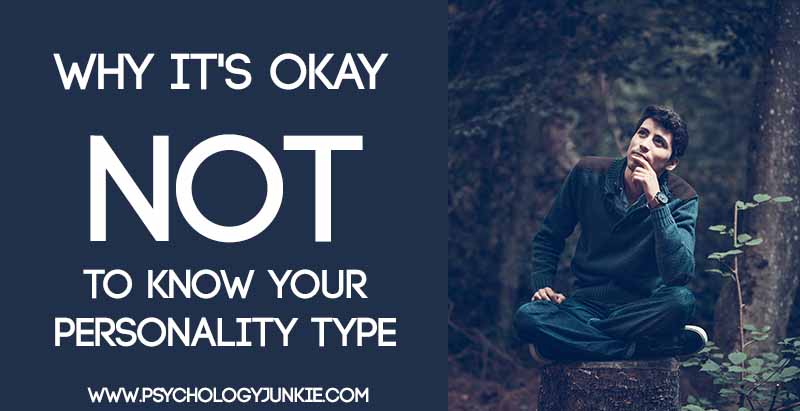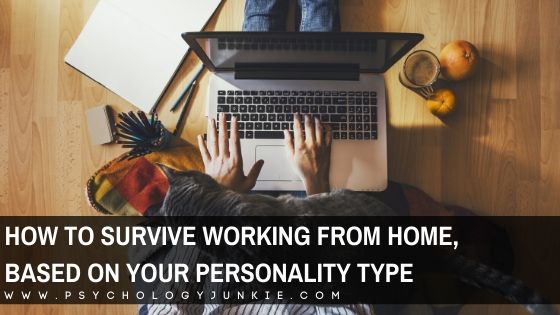Why it’s Okay Not to Know Your Personality Type
“Am I an INFP or an INFJ?”
“Am I a Sensor or an Intuitive?”

“I’m questioning my type…what if I’m really an ESTP and not an ENTP? I’m so confused!”
So I’m going to start this post by letting you in on a little secret…
For many years I hesitantly thought I was an INFJ.
I paid thousands of dollars for an MBTI® certification and training. I spent over a decade studying type and reading every book possible on the subject. I read “Psychological Types” three times and highlighted about 30% of the book. I spent years blogging about type and being paid to help type people.
But you know what? I still had moments of doubt. I still wondered whether I got it wrong. I still had days where I wondered if I was an INFP and not an INFJ, or maybe I was an INTJ? Maybe I was an ISFP (although my lack of physical awareness makes this one highly unlikely).
And yeah, I know all those types have completely different cognitive functions. And years later I realized that I was, in fact, an INTJ.
Why Being to Attached to Your Type is Unhealthy
I was watching a Facebook Live broadcast featuring Antonia Dodge from Personality Hacker a few months ago. In it she said that she likes to say “I identify with the ENTP type” instead of saying “I’m an ENTP”. I appreciated that so much because there is so much more to each person than a four-letter code. When we start trying to find the answers to all of our problems in typology theory we end up putting ourselves in boxes. I’ve found myself doing this. I’ll have moments of intense nostalgia and think, “wait…I’m an INTJ, I shouldn’t be nostalgic, that’s a Si thing, right? Maybe I’m mistyped…maybe I’m an ISTJ” somehow “nostalgia” didn’t fit into my “box” of INTJ based on all the type research I’d done thus far. There have been times where I use my type as a crutch to limit my abilities in certain areas. It’s not something I’m proud of, but it’s something that can happen when you place too much of your identity into cognitive functions or four-letter codes or dichotomies.
There is so much more to each individual than typology can ever encompass.
You have your own unique history, your own life experiences, your own mind, values, ideals, religious or non-religious beliefs. Your type can only explain a small fraction of who you are and why you do the things you do.
Type Superiority
Typology is supposed to be used as a way to understand ourselves and others better. Unfortunately it also has become a way for people to feel superior to others. We may become so fixated on an incorrect assumption (“Intuitives are creative. Sensors are not.”) that we are unwilling to entertain the idea of being another type. I don’t know how many times I see people make blanket generalizations about other types that are completely inaccurate. Yesterday someone commented on my blog saying that all ESTPs are narcissists. A month or so ago someone posted an infographic on pinterest that said the way you can tell the difference between an INTJ or an ISTJ is if one is innovative or not, because apparently “ISTJs are never innovative”. This is completely inaccurate, but these stereotypes and assumptions are part of the reason many people are afraid to entertain the idea of being another type.
It’s Not Anyone’s Job to Correct People About Their Type
I would guess that about 90% of the “intuitives” I meet are actually sensors. Do I sit them down and confront them about their incorrect typing? No. That’s just a jerky thing to do. I’m usually much more impressed with someone who says “hey…I’m not sure if I’m X type or X type” than someone who says “I’m absolutely this. And you’re absolutely not what you say you are.” Someone’s personality type is their own business. Unless you ask me directly to help you find your type, I’m not going to go around pointing out the ways in which you are not whatever type you say you are.
Because you’re you. Maybe you identify with certain aspects of a type, but not others. Maybe there’s a whole bunch of things about you that I don’t see because you only show a fraction of yourself to the outside world. Maybe relating to another type right now is good for you. Your type is your business and not mine or anyone else’s. We (anyone who’s obsessed with typology) need to stop being “type police”, especially when we might be mistyping ourselves in the first place.
Don’t Let Articles About Type Define You or Limit You
There are articles that explain why introverts don’t like talking on the phone (I’m very much an introvert, but I enjoy talking to friends on the phone) or why INFJs feel so misunderstood (feeling misunderstood isn’t a prerequisite to being an INFJ). There are articles explaining why each type is better/more special/superior to other types. I’ve read articles that say “You’re an INFJ if you do X number of things” and literally know people from almost every type who do those things. I’ve read articles that say certain types would fail at certain jobs when I know people with that type who succeed at those jobs. I’ve written inaccurate articles myself that I’ve had to go back and re-write after learning more about type. Don’t be afraid to second-guess what you read.
In Conclusion…
Your personality type doesn’t define all of you. It doesn’t tell you what your values and beliefs are. Are you putting boxes around yourself because of your type? Are you constantly questioning your type? Do you feel like you’re shaping your life to fit some stereotypical version of a type? Do you feel like you’ve called yourself a certain type for so long that now questioning it would be a betrayal of your identity?
Guess what? I relate most to the INTJ type…learning I was an INTJ helped me to understand why I had hunches and visions that came out of the blue. It helped me to understand why I showed support to others by trying to problem-solve for them and struggled so much with sensory details. But I’m open to being wrong about myself. When someone tells me I’m mistyped (which, as a personality blogger, people enjoy telling me), I actually take the time to question it. Even though I’ve written articles about how to tell if you’re an INTJ or an INFJ or an INFP or an ISFJ I still have days where I’m not sure. And that’s okay. Because at the end of the day I’m me. That four-letter code may help me to understand certain parts about myself, but it doesn’t explain everything. We’re not stuck in boxes. We don’t need to trap ourselves. We’re not always going to behave like the “perfect” version of a certain type.
So all this to say if you’re not sure of your type, that’s okay. You’re okay. You can say “I relate to being an INTP the most, but maybe I’m an INTJ, or an ISTP or an INFJ…all I know is that this is what seems right for me. Everything matches up right now.”
And if you really want to wander down another deep, dark alley of typology you can learn about shadow functions. Those explain many of the reasons that you sometimes behave in “type-contrary” ways. But even then it’s good to remember that your personality is your own. Even if you have the most common personality type out there, there are things about you that make you completely one-of-a-kind and different from everyone else in the world.
Other Articles You Might Enjoy:
Are Certain Personality Types Smarter Than Others?
How You Use Your Brain Based on Your Myers-Briggs® Personality Type
Subscribe to Our Newsletter

Want to discover more about personality type? Get the inside scoop with Susan Storm on all things typological, along with special subscriber freebies, and discounts on new eBooks and courses! Join our newsletter today!
















Hm. It’s just recently I take in information about (my) type. After doing a test (and a few more) and read some I realized that I and all these others can’t help it we are different and that this is a tool to understand each other. But today for the first time I felt hopeless about typing : knowing my type and knowing your type is totally different robs me of the illusion (?) we can get together.
It is for this reason that I am wary about excesses of precision especially around tertiary and inferior functions which would represent only 10% of our cognitive use, whatever age… This is worrying unless we demonstrate it scientifically. It would be clearly a coffin for our evolution.
Neuronal plasticity allows evolution. I like say ISNF in my case, the thought, judgment and perception are obvious. But many people lack empathy, creativity or reserve.
This article is gold. I used to spend so much time boxing myself (and others) into MBTI types, and then I started to realize how CONFINING it was. For the longest time, I stopped reading web articles about MBTI, because I realized how much they were unconsciously defining my perceptions of myself. Myers-Briggs is a guideline, not a lifeline. I wish more people would understand that.
Exactly! I love the MBTI the best because it opens us up to accepting differences between people, to understand that what works for me might not work for other people, and also I find it very important to take what I read with a large critical healthy grain of salt and see the hidden meanings in what people try to say based on their personal experience and what they actually say.
And I love saying “I identify as…”. Way before I learnt about MBTI, I learnt about a thing called E-Prime (or English Prime, as in English 2.0) that forbids the verb “to be” because virtually all of the time it causes us to inadvertently lie, as it says we know something 100% that something is something else, that we are something, when we can never really know that.
From what I have read, I don’t think the MBTI system has ever said how a type should act or behave, but how a person’s mind works going from A to B, taking in information and making decisions.
In terms of nostalgia, as a self-typed INTJ (first test had me as an INFX, second had me definitely as an an INFP), I know nostalgia can come from many different cognitive functions and their interplay, and that functions together can create a false sense of another function. With the INFJs (and some INTJs) that I know they can have a lot of nostalgia, for quiet places that have gone, a favourite tree (line of trees). Our Ni abstracts that feeling of connection that most other types might only form with people and ties it into many other things, whether trees / nature / freedom. As INXJs we have a very strong value system tied to our Ni and that can create a feeling of nostalgia, of loss. I think on the surface, nostalgia for Ni and Si can seem similar, but deep down it feels quite different, the going from A to B of above.
Thank you for your input! Yes, a lot of the cognitive functions in working together can produce different feelings or impressions that might seem similar to another cognitive function. I also think environment, life changes, and so many other factors can contribute to things like nostalgia or homesickness. And yes, the Myers-Briggs system is definitely more about how we process information and decide, but behavior can be very different from person to person within a type! I really appreciate your input, thank you for sharing! 🙂
I am really on the fence when it comes to Ne or Se as my primary function. Ti is definitely how I make decisions, and Fe is also a factor in sharing ideas. I get caught in the loop sometimes between deciding what I think makes sense versus deciding on something just to please others.
I am fascinated by science and technology, but I very rarely think about the future. I definitely notice and can tell that things are changing very quickly in regards to climate and weather. I only really think about possibilities and the like if I find the ideas themselves interesting, then I either use or discard them. If I am very bored or go without exercise or don’t listen to music or take care of myself, I can start thinking about some very dark stuff. I find myself getting fixated on abstract “whatevers”, rather than being the laid back, happy-go-lucky person that I naturally am.
I do forget things from time to time, and I can miss details or make mistakes if I’m not paying attention. I can be pretty random and say some witty stuff. Sometimes I’ll argue or debate just for fun, or if I am trying to understand the logic of something. I never identified as a jock, but I like to exercise and watch some sports. I also love to eat as well, so I will need to tip the scales in the other direction before things get out of hand!
I’m kind of nerdy, really. I guess that is how I identified with most ENTP descriptions, but I just can’t help but think that most of the websites have an inherent intuitive bias. I’m definitely not as spontaneous as I’d like to be, and I’m hardly the jockish adrenaline junkie that ESTPs are described as being. I’m just me, and I’m content to be me. At the end of the day, personality typing is a sham. Personality is not defined by a sequence of contrasting and conflicting functions, but it’s definitely interesting to look at that way!
This is exactly the article I needed to see. I’ve been questioning my type for as long as I’ve been into typology. I’m probably an INTP, but I might also be an INFJ, an INFP, or an ISTP. I’m thinking INTP because I’m almost definitely a Ti user and an Fe user. I’m also almost definitely an Si user as well. However, the descriptions that say that INTPs don’t care about other people’s feelings doesn’t sound like me at all. I care more than anyone could ever know about my friends and family. I’m pretty “huggy” (which I’m wondering if that’s an Se thing) and I really do care about people. Am I just an Fe oriented INTP, or am I something else? It’s mostly between INTP and INFJ. I’m not sure if I can bring myself to accept that I’ll never know, but I may just have to live with it and keep researching. Any advice or opinions would be greatly appreciated. Thanks!
As someone who is very close to one or possibly more INTPs, they can be very sensitive and caring people. They’re just not always great at showing it, especially if they don’t know you. It’s easier to express ideas or interests than to deal with messy things like emotions, which cannot be easily quantified. Those who describe INTPs as robotic generally don’t know any INTPs very well.
I get hooked on this s–t a couple times a year (okay more like four or five times a year). But the episodes generally last no longer than a couple weeks; let it go and get back to other interests. Except this time. About a solid month and it’s like a fly buzzing around my nose and ears and refuses to cooperate and either identify itself or depart the premises.
Actually that was more like last week, as by now it’s come to the point where it feels like 8 little gophers have taken up residence under the floor. One will pop its head out and say, “maybe I’m your dominant function” so I check it and think maybe this is finally it. Oh but then just as I draw nearer to that little gopher, another pops up on the other side of the room, and says, “or maybe I’m your dominant function” and while I consider that one the first has disappeared. They’re starting to get on my nerves, those 8 pesky little gophers.
Funny thing is, there is a soft voice that speaks from the recesses that suggests maybe at the end of the day I don’t really want to come to a conclusion because it will signal the end of the story.
I think I’ve read about 27,000 of your articles and this one compelled me to comment.
Hi Susan! First of all I want to thank you from the bottom of my heart for all your articles! They helped me a lot to understand others and myself way better than before. I must recognise though… That I took personality types a little too far and I considered that I can’t do certain activities because it implies Dominant Introverted Sensing or Extraverted Thinking and I somehow limited myself.
I wanted to ask why you’ve wrote at the beginning of the article the title : ” Why being married to your type is unhealthy” and why you didn’t actually wrote anything about this. I was a bit scared when I’ve read this. Sincere appreciation ????????
I’m so glad that you enjoy the articles!! What I meant when I wrote that was not to get too attached to your type. Don’t limit yourself based on your type or use it as an excuse for certain things – I encounter people who do this (and even I myself have fallen into that trap sometimes) and so that’s what I meant. Thanks to your comment I re-worded it so it is hopefully less confusing!! 🙂 Thank you!!
Hello. I’m really glad to be able to find this article. I’ve been stressing myself out about whether I am actually an INFJ or INFP. MBTI has helped me learn how my body work and I hoped I could use it as a self-improvement tool. But then I found that I can relate to some parts and cannot relate to some parts of INFP and INFJ. It made me feel like I can’t fit in anywhere. I’m worried I have limited myself by unconsciously forced myself to fit in one of the two. I’m sorry if that doesn’t make sense….
It’s funny because at the same time I believe that everyone is unique. No one is exactly the same with each other. I agree that we shouldn’t have any “box” limit ourselves. Therefore, thank you very much for your open-minded insight. For now, I think maybe I should just … take anything I deem useful for my self-improvement from both articles about INFP and INFJ 🙂
Yeah, it is pretty accurate. Thank you. I am tired of myself putting myself into the box and getting upset that I do not fit in certain results or because my type viewed as a jerk or socially unaware. I actually my functional type is ENTP(Ne Ti Ni Fi Fe Te Se Si) but as you see the order of other functions do not fit into the system we are prescribed to. In the dichotomy I mostly on every test fall into INTP type, but when it comes to descriptions I mostly relate both to INTP and INFJ types. My level of agreeableness and extroversion are 50%, so I am quite in the middle. On the enneatype test I get 5 or 7 or 9 depending on the test. But mostly 5 and then equally get 7 or 9. So some traits of five and seven can be mine even though some people say that it is impossible. I am ENTP but pretty acceptable, supportive and artistic. I am tired of trying to put myself in the one box actually 🙁
Yeah, it is pretty accurate. Thank you. I am tired of myself putting myself into the box and getting upset that I do not fit in certain results or because my type viewed as a jerk or socially unaware. I actually my functional type is ENTP(Ne Ti Fi Ni Fe Te Se Si) but as you see the order of other functions do not fit into the system we are prescribed to. In the dichotomy I mostly on every test fall into INTP type, but when it comes to descriptions I mostly relate both to INTP and INFJ types. My level of agreeableness and extroversion are 50%, so I am quite in the middle. On the enneatype test I get 5 or 7 or 9 depending on the test. But mostly 5 and then equally get 7 or 9. So some traits of five and seven can be mine even though some people say that it is impossible. I am ENTP but pretty acceptable, supportive and artistic. I am tired of trying to put myself in the one box actually 🙁
Best thing I have ever read about mbti.
Congratulations Miss Susan!
By the way, in my opinion, I wouldn’t say 16 personality types, I would say 16 more general personality functions. All people have all these 16 general functions/personality types to a lesser or greater degree and we all use all 16 of these general functions, depending on the work we do each time.
For example, being an infj means that you use the general infj function a lot, but not just this one.
If we make a parallel with chemistry, the 8 cognitive functions are the atoms, the 16 personality types are the molecules, formed by atoms 🙂